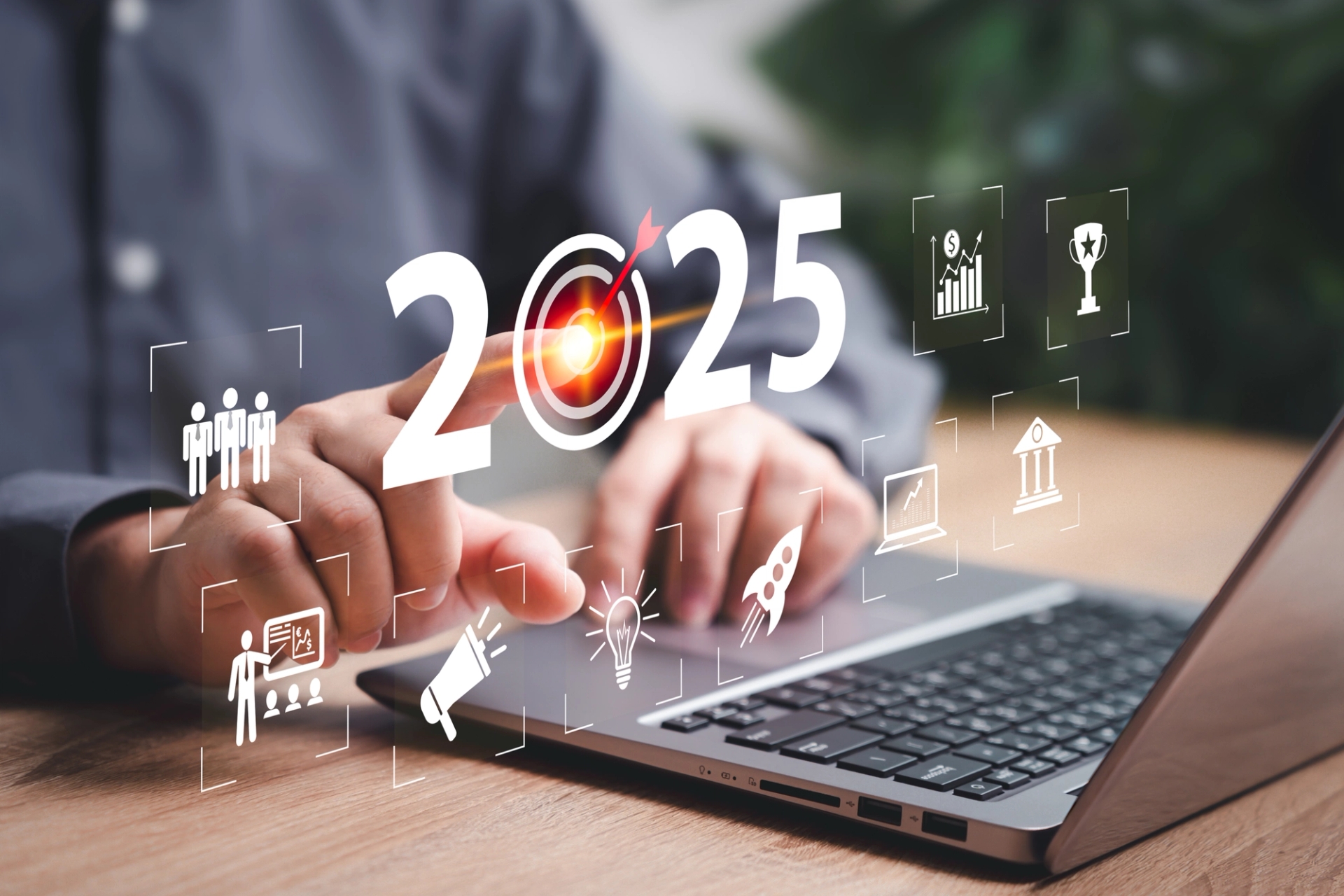Trends in Events You Must Not Miss in 2025
Discover the top trends shaping the events industry in 2025 and an in depth guide on how to create unforgettable experiences.

Tip: Focus on Innovation, Immersion, and Impact
The event industry is in the middle of a dynamic transformation. As we move further into 2025, the event trends reflect a deeper focus on attendee engagement, event personalization, and meaningful use of advanced technology to enhance event experiences. Emerging trends highlight the importance of attendee experiences, emphasizing personalization, interactivity, and data collection to create engaging environments that resonate with attendees.
With event planners and event organizers seeking more efficient, engaging, and immersive experiences, it’s crucial to stay ahead of the latest event planning trends. Whether you’re planning in-person events, virtual events, or hybrid events, these key event trends will shape your next event strategy.
We surveyed event organizers and attendees from across the globe, conducted in-depth interviews, and analyzed industry data to curate the following list of key trend for you.
Introduction to the Event Industry
The event industry is a dynamic and rapidly evolving field that encompasses a wide range of activities, from conferences and meetings to festivals and weddings. As an event planner, it’s essential to stay up-to-date with the latest event trends and technologies to deliver successful and memorable events.
The role of event planners, event organizers, and event professionals is crucial in navigating this ever-changing landscape. They are responsible for creating engaging experiences, managing logistics, and ensuring that every detail aligns with the overall event strategy. By understanding the fundamentals of the event industry and keeping abreast of emerging trends, event planners can craft events that not only meet but exceed attendee expectations.
Why is it Important to stay up to date in the Event Industry
The event industry is a fast-evolving landscape that encompasses everything from corporate conferences and trade shows to hybrid events and virtual experiences.
As technology, audience expectations, and global trends shift, event planners and event organizers must adapt to create impactful, engaging, and memorable events. Understanding the foundations and emerging dynamics of this industry is key to planning successful events in 2025 and beyond.
Top Trends of 2025:
1. Event Personalization with AI
In 2025, event personalization is no longer optional — it’s expected. AI tools help save days if not months of effort in event planning. AI is enhancing event planning by providing data-driven enhancements that improve logistics and identify new revenue opportunities.
Using first party data and real time data collection, event professionals can now personalize every step of the attendee's journey.
- Customized content and agendas based on user data
- Smart matchmaking and curated networking
- AI-generated session recommendations
- Behavior-driven communications pre and post-event
AI will drive productivity and collaboration in event management. Event planners are leveraging event tech to enhance every touchpoint, ensuring that attendee experience goes far beyond the average event.
Platforms that offer AI-based matchmaking, content curation, and attendee data insights are becoming essential in delivering successful events.

2. How Hybrid Events and Virtual Formats Are Transforming the Event Industry
Hybrid events continue to redefine how we connect. Searches for the term 'hybrid event' increased by 309% over the last five years.
In 2025, expect hybrid event formats to be even more seamless, with event platforms enabling immersive engagement for both virtual attendees and those attending onsite events.
- Real-time chat, Q&A, and polling tools for both audiences
- Smaller breakout rooms for deeper interaction
- On-demand content access for virtual viewers
- Cross-platform experiences for hybrid participants
We're also seeing the rise of smaller virtual events that focus on niche communities, boosting meaningful connections, localized participation, and more targeted event content. These shifts reflect major event trends and evolving event planning strategies in the events industry.
To make most out of it, ensure you are planning events with a platform which offers event tech to support these advancements. You can use platforms like Azavista to use their event management tool for managing all kinds of in-person, hybrid or virtual events.
3. Event Planning Trends Focused on Emotional and Memorable Experiences
Attendees prioritize tailored experiences that enhance the overall event experience. The measurement of a successful event is evolving from ROI to ROE — Return on Emotion. Event organizers are incorporating multi-sensory elements to create immersive experiences for attendees.
- Events designed around emotional takeaways
- Spaces that spark human connection
- Post-event experiences that extend the emotional high
- Interactive environments that deliver memorable impact
- Creating exclusive experiences, like VIP packages, enhances the memorability of events.
This event trend fuels more engaging formats and a renewed focus on the attendee experience. Event teams are now designing experiences that foster lasting relationships, sparking memorable experiences rather than just delivering information.
Lastly, taking feedback from attendees is essential for shaping future event strategies and ensuring satisfaction.
4. Eco Friendly Event Management: Sustainable Practices
Eco-friendly event management is a crucial aspect of the event industry, as it not only reduces the environmental impact of events but also enhances the overall event experience. Sustainable practices, such as reducing waste, using eco-friendly materials, and supporting local communities, are becoming increasingly important for event planners and organizers.
By incorporating sustainable practices into event planning, event professionals can create memorable and impactful events that leave a positive legacy. This includes sourcing local vendors to minimize travel footprints, opting for compostable materials, and choosing energy-efficient venues. Embracing green values not only aligns with attendee preferences but also fosters meaningful connections and helps events leave a lasting impact in local communities.
As climate awareness grows, eco friendly practices are becoming essential in sustainable event planning and event management.
- Local vendor sourcing and reduced travel footprints
- Eco-conscious swag and compostable materials
- Energy-efficient venues and paperless planning tools
- Partnering with and supporting local communities
Event planners and event organizers are embracing green values to align with attendee preferences. This not only fosters meaningful connections but also helps events leave a lasting impact in local communities — a growing event trend.

5. Immersive and Tech-Driven Event Experiences
Event technology is a must to include. Tech-fueled immersive experiences are now a necessity of in person events and the virtual world alike.
- AR product demonstrations and gamification
- VR venue walkthroughs and simulations
- Projection mapping and interactive installations
- Touchless tech, smart badges, and app-based navigation
These event tech experiences boost attendee engagement and enrich the event experience. Event professionals are using innovative tools to craft truly dynamic, unforgettable environments. It’s a must-follow event trend for every event planner.
6. Leveraging Event Data for Better Decision-Making
Access to real-time and post-event event data is empowering event planners to:
- Optimize event schedules and speaker lineups
- Track event performance and engagement
- Measure ROI and ROE in real-time
- Personalize follow-up messaging and nurture streams
- Understand attendee preferences and behaviors
Whether you're planning small in person events, virtual events, or large meetings and events, analyzing attendee data is now essential. It’s one of the most influential event industry trends redefining modern event planning.
Why is capturing attendee information, including job title, important?
Capturing detailed attendee information, such as job title, is crucial for enhancing personalization and improving event planning. By collecting this data through registration and participant engagement, event planners can tailor experiences and optimize future events based on attendee interests and behaviors.
7. Experiential Event Design by improving Attendee engagement
Today’s event design focuses on storytelling, interaction, and creativity:
- Multi-sensory brand activations
- Immersive tunnels and thematic visuals
- Interactive food, beverage, and lounge areas
- Branded installations and live art
These experiential elements help deliver valuable content and elevate the overall event experience. This event trend helps event organizers stand out in a competitive event space and deliver more personalized experiences.

8. Localized Formats and Hyper-Personalized Event Content
The most important feature of events is that they provide networking opportunities. Which is why, more event planners are turning to localized strategies and community-first event formats:
- Pop-up events tailored to city culture
- Collaborations with local influencers or creators
- Personalized agendas and region-specific event content
- On-the-ground activities that reinforce community alignment
This localization trend strengthens ties to local communities, delivers more relevant experiences, and supports sustainable practices. It's a key event trend that benefits both attendees and brands.
9. Budgeting Smarter for Rising Costs and Impactful Experiences by using event platforms
With rising costs, managing event budgets smartly is more important than ever. You can use event planners which provide valuable insights for you to maximize the ROI. Few things you can keep in mind are:
- Reusable decor and modular setups
- Cost-effective digital experiences
- Vendor collaboration and transparent pricing
- Data-backed decisions for optimizing spend
Despite constraints, the pressure remains to create successful events. Efficient budgeting strategies help planners design high-impact events that impress without overspending — a practical event trend every organization must adopt.
10. Events as Growth Channels and Marketing Engines
Event professionals are not only looking for events which offer interaction, but they link modern event management directly to business growth:
- Virtual registrations feeding CRM and sales
- Shareable video content from live events
- Influencer collaborations across online events and in person activations
- Event storytelling used across other marketing channels
Using an integrated event platform, event teams can transform a single event into weeks of valuable content and pipeline growth. This is a powerful event trend leading 2025's marketing innovations.
11. Marketing Trends in Events
In 2025, event marketing is all about personalization, data, and storytelling. They try various methods to increase maximize pre-event buzz and registration.
- Event planners and organizers are using multichannel strategies, social media teasers, influencer partnerships, email drip campaigns and targeted ads.
- Post-event, repurposing valuable content like speaker clips, attendee testimonials, and highlight reels helps extend reach and generate ongoing engagement.
- Leveraging event platforms for analytics allows planners to track performance, optimize campaigns in real time, and understand attendee preferences through real time feedback.
These innovative event marketing strategies are organizers recognized ways towards increasing visibility, boosting attendance, and turning each event into a powerful growth engine.
12. Creating Effective Event Content
Creating effective event content is critical to the success of any event. Event content can include keynote speeches, panel discussions, workshops, and networking opportunities. To create engaging and relevant content, event planners must understand their target audience and tailor their content accordingly.
This can involve using data analytics to gain valuable insights into attendee preferences and expectations. By creating personalized and immersive experiences, event professionals can increase attendee engagement and satisfaction. Whether it’s through interactive sessions, thought-provoking discussions, or hands-on workshops, the goal is to deliver valuable content that resonates with attendees and enhances their overall event experience.
13. Measuring Event Success
Measuring event success is essential to understanding the impact and effectiveness of an event. Event planners and organizers use various metrics, such as
- attendance numbers
- survey feedback
- social media engagement
By analyzing event data, event professionals can identify areas for improvement and make data-driven decisions to enhance future events.
Additionally, measuring event success can help event planners demonstrate the value of their events to stakeholders and sponsors. This process involves tracking key performance indicators (KPIs) and using tools like real-time data collection and post-event surveys to gather comprehensive feedback. Ultimately, these insights enable event planners to refine their strategies and deliver even more successful events in the future.

The Future of Events
The future of events is exciting and rapidly evolving, with new technologies and trends emerging all the time. Hybrid events, which combine in-person and virtual elements, are becoming increasingly popular, offering event planners and organizers greater flexibility and reach.
The use of event technology, such as mobile apps and real-time data collection, is also on the rise, enabling event professionals to create more personalized and immersive experiences. As the event industry continues to grow and evolve, it’s essential for event planners and organizers to stay ahead of the curve and adapt to changing attendee expectations and technological advancements.
By embracing innovation and sustainability, event professionals can create successful and unforgettable events that leave a lasting impact. The integration of advanced technologies and a focus on attendee engagement will be key drivers in shaping the future of the event industry.
Looking for tools for planning next-gen events by making most out of the trends in events?
Our platform can help you in executing the latest event trends, implement smart event management strategies, and deliver immersive, effective experiences across all event formats. Reach out today to elevate your event planning approach!
Embracing Event Industry Trends and Shaping the Future
The most impactful event industry trends of 2025 center around innovation, sustainability, personalization, and data. As event planning becomes more intentional, community-oriented, and experience-led, leveraging data-driven insights for future event planning will help many organizations in exceeding the attendee expectations.
Whether you’re preparing a hybrid event, an intimate in person meetup, or a high-scale virtual event, the right combination of event strategy, event technology, and creative storytelling can create truly successful events.
Let your next event reflect the future of the event industry — driven by insight, designed with purpose, and delivered with impact.
Looking for tools in planning next-gen events by making most out of the trends in events?
Our platform can help you in executing the latest event trends, implement smart event management strategies, and deliver immersive, effective experiences across all event formats. Check out today to elevate your event planning approach!
Other Useful Resources:
- Dynamic Data, Dynamic Results: Transforming Event Reporting with Real-Time Analytics
- Optimizing Global Event Strategies with Centralized Management
- Why Conference Software Is Crucial For Event Success In 2025
FAQs
Q- What is the meaning of trending events?
Trending events refer to event formats, strategies, or themes that are currently gaining popularity or showing significant growth within the industry. These trends often reflect evolving attendee expectations, technological advancements, or cultural shifts — such as the rise of hybrid events, sustainability practices, and experience-driven formats.
Q-What are current event trends?
Some of the current event trends in 2025 include:
- Hyper-personalization through AI and data
- Seamless hybrid and virtual event integration
- Immersive and multi-sensory experiences
- Sustainable event practices
- ROI and ROE (Return on Emotion) focused planning
- Smart budgeting and resource optimization
- Localized and community-first event strategies.
Q- What are some of the latest trends in the event industry?
The latest trends shaping the event industry in 2025 are:
- AI-powered event planning tools for agenda curation and matchmaking
- VR and AR technologies for product demos and venue simulations
- Experience-led design focusing on emotions, storytelling, and engagement
- Use of event platforms for data-driven decision-making
- Events being leveraged as marketing engines with repurposable content
Q- Is the event planning industry growing?
Yes, the event planning industry is growing steadily. With increased demand for innovative, engaging, and hybrid-capable experiences, the global events sector is seeing expansion in both corporate and consumer segments. Technological integration, digital events, and evolving attendee behavior are fueling this growth.
- Is event planning in high demand?Absolutely. Event planning is in high demand, especially as businesses, communities, and brands recognize the value of well-executed events for networking, branding, education, and sales. From virtual summits to curated in-person meetups, skilled event planners are needed to deliver results-driven experiences.
Q- What is the future of the event industry?
The industry is evolving into a hybrid of experience, technology, and storytelling, where data drives insights and engagement becomes the core KPI.
- AI-assisted planning and hyper-personalization
- More immersive, tech-integrated event formats
- Stronger focus on sustainability and social responsibility
- Community-building and localized experiences
- Events serving as central content and growth hubs for brands
Q- What are the 5 C’s of event management?
The 5 C’s of event management are mentioned below. These stages help ensure structured, strategic, and successful event delivery.
- Concept – Defining the event's purpose, theme, and target audience
- Coordination – Organizing logistics, vendors, teams, and timelines
- Control – Managing resources, risks, and quality throughout
- Culmination – Execution of the event on the day itself
- Closeout – Post-event activities like feedback, reporting, and ROI analysis
Q- What is the biggest challenge facing the events industry at the moment?
The biggest challenge facing the industry today is balancing rising costs with high attendee expectations. As events grow more sophisticated, organizers must create meaningful, immersive experiences without overshooting budgets. Sustainability, inclusivity, and digital fatigue are also pressing concerns.
Q- What are the corporate event trends in 2025?
Corporate event trends in 2025 include the following. These trends reflect a shift from formal, large-scale events to more intentional, impactful, and tech-forward experiences.
- AI-curated agendas and attendee journeys
- Smaller, localized gatherings with targeted content
- ROI + ROE-based outcome tracking
- Smart, flexible budgeting strategies
- Increased use of event tech platforms for data, engagement, and marketing
- Emphasis on sustainability and DEI (Diversity, Equity, Inclusion)
More Event Management












